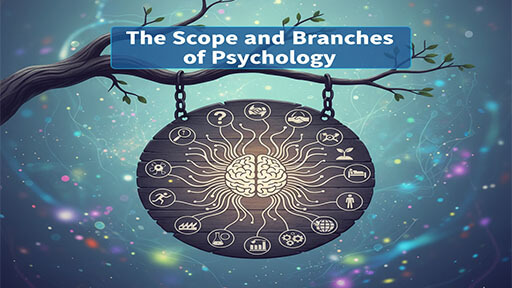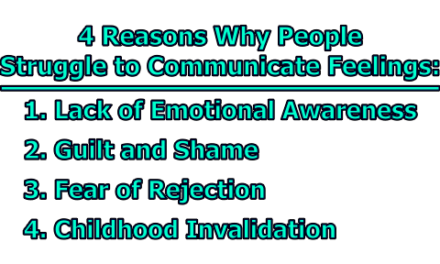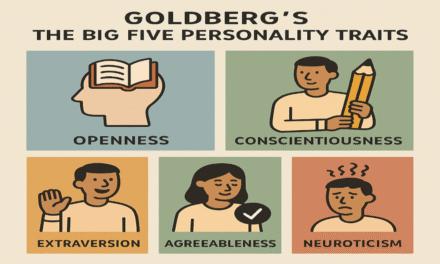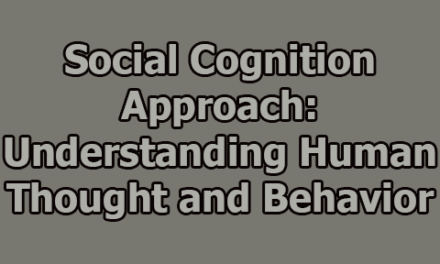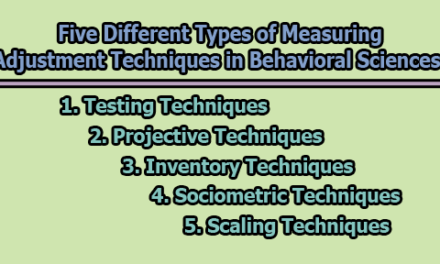The Scope and Branches of Psychology:
Psychology is the scientific study of mind and behavior. Its scope is very wide, covering how people think, feel, learn, and act in different situations. To better understand human behavior, psychology is divided into various branches such as clinical, educational, social, and industrial psychology. Each branch studies a specific area, but together they show how psychology applies to both theory and real life. In the rest of this article, we will explore the scope and branches of psychology.
Scope of Psychology:
Psychology, broadly defined as the scientific study of mind and behavior, has an expansive scope that touches nearly every aspect of human life. It seeks to explain how individuals think, feel, and act, and how both biological and environmental factors shape these processes. The discipline has grown from philosophical roots into a multifaceted science, combining experimental research with practical applications across education, health, industry, law, and society. The scope of psychology can be categorized into several key areas.
1. Study of Mental Processes: One of the core functions of psychology is to explore the internal workings of the human mind. This includes:
- Thinking and Reasoning: How people make decisions, solve problems, and engage in creative thought.
- Memory: How information is encoded, stored, and retrieved, and why forgetting occurs.
- Perception: How individuals interpret sensory information to understand their environment.
- Emotions: The nature, expression, and regulation of emotions such as joy, anger, fear, and sadness.
- Learning: The processes by which individuals acquire new knowledge or skills through conditioning, observation, or experience.
Example: When a student studies for an exam, encoding and retrieval of facts involve memory processes, while problem-solving during test questions involves reasoning and thought.
2. Heredity and Environment: Psychology is deeply concerned with the age-old nature versus nurture debate. Both hereditary and environmental factors interact to shape behavior:
- Heredity (Nature): Traits inherited genetically, including intelligence potential, temperament, or vulnerability to mental disorders.
- Environment (Nurture): Influences of family, culture, education, socioeconomic background, and peer groups.
Modern psychology emphasizes that behavior results from the interaction of these two forces, not from either alone. For instance, a child may inherit a musical inclination, but whether this talent develops depends on access to training, cultural appreciation of music, and encouragement.
3. Psychology as a Science: Unlike philosophy or speculation, psychology relies on the scientific method to build knowledge. Psychologists:
- Observe human or animal behavior systematically.
- Form hypotheses to explain observations.
- Conduct experiments or controlled studies.
- Collect and analyze data to test hypotheses.
- Draw conclusions that are evidence-based and replicable.
This scientific approach ensures that psychology is grounded in empirical evidence rather than intuition or tradition.
4. Applied Psychology in Industry (Industrial and Organizational Psychology): Psychology has a major role in the world of work and productivity. Industrial and Organizational (I-O) Psychology focuses on:
- Designing recruitment and selection processes.
- Improving employee motivation, leadership, and teamwork.
- Enhancing workplace ergonomics and safety.
- Managing stress and work-life balance.
- Increasing efficiency and satisfaction in organizations.
Example: A company may use psychological research to design flexible workspaces that reduce stress and improve creativity among employees.
5. Psychology in Education: Educational psychology is another vital scope. It focuses on:
- Understanding how students learn and at what developmental stages.
- Designing effective curricula, teaching methods, and assessment tools.
- Identifying and supporting students with learning difficulties.
- Encouraging motivation, discipline, and emotional well-being.
- Training teachers to adapt to diverse learning needs.
Example: Teachers may use reinforcement strategies from behavioral psychology to encourage active participation from shy students.
6. Social and Group Behavior: Social psychology investigates how individuals think, feel, and behave in social contexts. This includes:
- Group Dynamics: Leadership, conformity, cooperation, and conflict within groups.
- Social Influence: How opinions, attitudes, and behaviors are shaped by society and peers.
- Mass Behavior: Phenomena such as crowd behavior, propaganda, and collective movements.
Example: Individuals may act more aggressively in a crowd than when alone because anonymity reduces accountability.
7. Clinical and Counseling Applications: Psychology also extends into the domain of mental health through:
- Clinical Psychology: Diagnosing and treating mental illnesses such as depression, anxiety, and schizophrenia.
- Counseling Psychology: Helping people with everyday challenges such as stress, relationships, and personal development.
This area contributes to personal well-being and public health by promoting resilience and coping strategies.
8. Developmental Psychology: Developmental psychology studies changes across the lifespan:
- Infancy and Childhood: Cognitive and emotional development, language acquisition, attachment.
- Adolescence: Identity formation, peer influence, and moral development.
- Adulthood and Aging: Career choices, family life, cognitive decline, and adaptation to aging.
This helps educators, parents, and caregivers understand how needs evolve with age.
9. Health and Environmental Psychology:
- Health Psychology: Examines how behavior, cognition, and social factors influence physical health, prevention of disease, and coping with illness.
- Environmental Psychology: Explores how physical spaces, urban design, and natural environments affect human behavior and mental well-being.
Example: Designing hospitals with natural light and greenery to promote faster recovery reflects principles of environmental psychology.
10. Forensic and Legal Psychology: Forensic psychology applies psychological principles to the legal system, including:
- Understanding criminal behavior.
- Assisting in jury selection.
- Evaluating witnesses and suspects.
- Providing expert testimony in courts.
The scope of psychology is vast, spanning both theoretical and applied domains. It seeks to understand mental processes, the balance of heredity and environment, and human interaction with society and technology. Its applications extend into education, health care, industry, law, and environmental design. Ultimately, psychology enriches human life by providing tools to solve problems, enhance learning, promote well-being, and improve interpersonal and societal functioning.
Branches of Psychology:
Psychology is a broad subject that studies the mind and behavior from many different angles. Because human behavior is complex, psychology is divided into many branches, each focusing on a specific area. Below are the main branches explained with examples.
1. General Psychology: General psychology deals with the basic principles of human behavior and mental processes. It studies how people think, learn, remember, feel, and behave in everyday life. It provides the foundation for other branches of psychology.
- Topics include: attention, memory, intelligence, personality, motivation, and emotions.
- General psychology is like the “basic science” of psychology, giving the background knowledge for applied fields.
Example: A general psychologist may study how stress affects concentration in students during exams.
2. Abnormal Psychology: This branch focuses on mental disorders and abnormal behavior. It studies causes, symptoms, diagnosis, and treatment of psychological conditions.
- Topics include: depression, anxiety, schizophrenia, phobias, obsessive-compulsive disorder, and personality disorders.
- It is closely connected with clinical psychology and psychiatry.
Example: An abnormal psychologist may study why some people develop post-traumatic stress disorder (PTSD) after an accident, while others recover quickly.
3. Child Psychology: Child psychology studies the mental, emotional, and social development of children. It looks at how children grow from infancy to adolescence and what factors influence their development.
- Topics include: learning, language development, emotional attachment, play behavior, and moral development.
- Child psychology also helps parents and teachers understand children better.
Example: A child psychologist may work with a child who has difficulty speaking or adjusting to school.
4. Clinical Psychology: Clinical psychology is one of the most important branches. It focuses on the assessment, diagnosis, and treatment of mental illnesses and emotional difficulties.
- Clinical psychologists use therapies like cognitive-behavioral therapy (CBT), psychoanalysis, and counseling.
- They often work in hospitals, clinics, or private practice.
Example: A clinical psychologist may treat a person suffering from severe depression by providing therapy and coping strategies.
5. Counselling Psychology: Counselling psychology helps people with everyday life problems, stress, and adjustment issues rather than severe mental disorders. It focuses on guidance and personal growth.
- Topics include: career counseling, family counseling, stress management, relationship guidance, and conflict resolution.
- Counselling psychologists often work in schools, universities, or community centers.
Example: A counselor may help a student choose a career path or guide a couple to improve their communication skills.
6. Animal Psychology: Animal psychology studies the behavior of animals to understand instincts, learning, and adaptation. Many experiments on animals help psychologists understand human behavior too.
- Topics include: conditioning, learning patterns, animal communication, and instincts.
- Famous studies like Pavlov’s dog experiment and Skinner’s pigeon experiments belong here.
Example: An animal psychologist may study how rats learn to run through a maze, which helps in understanding how humans learn and form habits.
7. Developmental Psychology: Developmental psychology studies human growth and change throughout life—from birth to old age.
- It looks at physical, cognitive, social, and emotional development.
- Divided into stages: childhood, adolescence, adulthood, and old age.
Example: A developmental psychologist may study how teenagers form self-identity or how elderly people cope with memory decline.
8. Experimental Psychology: Experimental psychology uses scientific experiments to study mental processes under controlled conditions.
- Topics include: sensation, perception, memory, learning, and problem-solving.
- It provides the scientific basis for many psychological theories.
Example: An experimental psychologist may test whether students learn faster with pictures or with words in a laboratory setting.
9. Industrial Psychology (I-O Psychology): Industrial psychology applies psychological principles to workplaces and industries. It is also called Industrial-Organizational Psychology.
- Topics include: employee motivation, leadership, teamwork, job satisfaction, and workplace safety.
- It aims to improve both productivity and worker well-being.
Example: A company may hire an industrial psychologist to design training programs that improve worker performance and reduce stress.
10. Physiological Psychology: This branch studies the connection between the brain, nervous system, and behavior. It is closely linked with biology and neuroscience.
- Topics include: brain function, hormones, neurotransmitters, and the effects of drugs on behavior.
- Physiological psychology helps us understand how biology shapes thought and emotion.
Example: A physiological psychologist may study how damage to the hippocampus affects memory.
11. Social Psychology: Social psychology studies how people think, feel, and act in social situations. It looks at how society and groups influence individuals.
- Topics include: group behavior, conformity, leadership, prejudice, attitude formation, and social influence.
- It helps explain behavior in groups, crowds, and societies.
Example: Social psychologists may study why people obey authority even when they disagree, such as in Stanley Milgram’s obedience experiment.
12. Psychometric Psychology: This branch is about measuring the mind. It develops and applies tests to measure intelligence, personality, aptitude, and attitudes.
- Psychometricians design reliable and valid tests for schools, jobs, and clinical assessments.
- It is important in education, career guidance, and research.
Example: IQ tests, personality inventories (like the Big Five test), and aptitude tests for jobs are part of psychometric psychology.
13. Educational Psychology: Educational psychology studies how people learn in educational settings. It focuses on improving teaching and learning methods.
- Topics include: teaching strategies, classroom management, student motivation, and learning disabilities.
- It helps teachers understand differences in learning styles among students.
Example: An educational psychologist may design special learning programs for children with dyslexia.
The branches of psychology cover every stage of life and every aspect of behavior—from normal thinking and learning to mental disorders, from childhood development to workplace behavior, from individual differences to social influences. Together, these branches give us a complete picture of human and animal behavior, and they provide practical solutions to real-life problems.
At the end of the day, we can say that the scope and branches of psychology reveal its importance in everyday life. From mental health and education to workplaces and social behavior, psychology helps us understand people and improve well-being. In short, psychology is both a science and a practical tool for solving human problems and supporting personal and social growth.
Frequently Asked Questions (FAQs):
Why is psychology considered a science?
Psychology is a science because it uses the scientific method. Psychologists observe behavior, form hypotheses, conduct experiments, collect data, and draw conclusions based on evidence, not guesswork.
How does psychology help in education?
Educational psychology helps teachers understand how students learn best, design effective teaching methods, prepare learning materials, and manage classroom behavior. It also supports students with special learning needs.
What is the difference between clinical and counselling psychology?
- Clinical psychology deals with serious mental health issues such as depression, anxiety, and personality disorders.
- Counselling psychology helps people handle everyday challenges such as stress, relationships, and career decisions.
Can psychology be applied in workplaces?
Yes, Industrial and Organizational Psychology applies psychological principles to workplaces. It studies leadership, motivation, teamwork, job satisfaction, and how to design safe, comfortable, and productive work environments.
How does social psychology differ from general psychology?
- General psychology studies basic processes like memory, learning, and emotion.
- Social psychology examines how people’s thoughts and actions are influenced by groups, culture, and society.
Why do psychologists study animals?
Animal psychology helps researchers understand learning, instincts, and adaptation. Many discoveries about human behavior, such as conditioning and habit formation, were first studied in animals like rats, pigeons, and dogs.
How do heredity and environment affect behavior?
- Heredity provides genetic traits such as intelligence potential, temperament, or talents.
- Environment (family, culture, education, peers) shapes how these traits are expressed.
Both work together to influence personality, abilities, and behavior.
What role does psychology play in health?
Health psychology studies how mental, emotional, and social factors affect physical health. It promotes healthy habits, helps patients cope with illness, and supports recovery from stress-related conditions.
What is the importance of experimental psychology?
Experimental psychology is important because it tests theories under controlled conditions. For example, experiments on memory, perception, or learning provide the foundation for other branches of psychology.
How does psychology help society?
Psychology helps reduce crime through forensic psychology, improves education, promotes mental health, increases productivity in industries, and enhances social harmony by studying prejudice, leadership, and group behavior.
References:
- Center for Elites. (n.d.). 13 main branches of psychology. Support Centre Center for Elites. Retrieved from https://support.centreforelites.com/en/13-main-branches-of-psychology/
- Ganster, D. C., Schaubroeck, J., Sime, W. E., & Mayes, B. T. (1991). The nomological validity of the Type A personality among employed adults. Journal of Applied Psychology, 76(1), 143–168. https://doi.org/10.1037/0021-9010.76.1.143
- Herbst-Damm, K. L., & Kulik, J. A. (2005). Volunteer Support, Marital Status, and the Survival Times of Terminally Ill Patients. Health Psychology, 24(2), 225–229. https://doi.org/10.1037/0278-6133.24.2.225
- Magreehan, D., & College, O. (n.d.). Subfields within psychology. In Introduction to psychology as a social science. Portland State University Pressbooks. Retrieved from https://pdx.pressbooks.pub/psy204flippedclassedition/chapter/subfields-within-psychology/
- OpenText, Washington State University. (n.d.). What is industrial and organizational psychology? In Psychology 105 text. Retrieved from https://opentext.wsu.edu/psych105nusbaum/chapter/what-is-industrial-and-organizational-psychology/
- San Diego Psychological Association. (n.d.). Subfields of psychology. Retrieved from https://sdpsych.org/Subfields-of-Psychology
- University of Texas at San Antonio. (n.d.). Subfields of psychology. HCAP. Retrieved from https://hcap.utsa.edu/psychology/subfield-psychology.html
- “Subfields of Psychology.” (n.d.). In Wikipedia. Retrieved from https://en.wikipedia.org/wiki/Subfields_of_psychology
- “Scope of Psychology.” Infinity Learn. (n.d.). Retrieved from https://infinitylearn.com/surge/topics/scope-of-psychology/
- “Introduction to Psychology and Its Subfields.” (n.d.). University of South Australia notes. Retrieved from https://www.numerade.com/notes/directory/school/4732/courses/316442/files/2923334
- Verywell Mind. (n.d.). Who founded the first psychology lab. Retrieved from https://www.verywellmind.com/who-founded-the-first-psychology-lab-2795250

Library Lecturer at Nurul Amin Degree College

